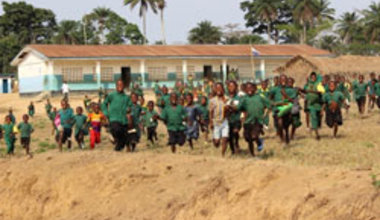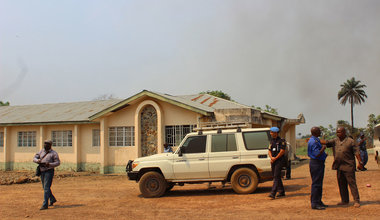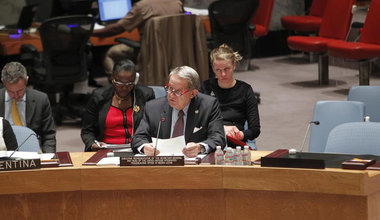Women’s leadership gaining momentum in Sierra Leone
6 April 2013 - UN Women in collaboration with the Ministry of Social Welfare Gender and Children’s Affairs (MSWGCA) and the Gender Technical Team has concluded a three day workshop in the northern district headquartered town of Makeni, aimed at improving the performance of female parliamentarians as legislators.
“Empowerment of women should not be seen as a challenge to men” Mr. Moijue Kaikai, Minister of Social Welfare Gender and Children’s Affairs. Minister Kaikai, who served as chair of the opening ceremony, commended the timeliness of the training. The minister seized the moment to appeal to his male colleagues to support the passing of the gender equality bill and the establishment of the women’s commission in order to fast track gender equality and women’s empowerment in the country. He appealed to the UN family to facilitate cross learning exchange programmes with sister countries in Africa that are doing well in the representation of women in governance like Rwanda and Uganda.
“Change is possible and change is happening” quoting UN Women Executive Director Michelle Bachelet at the recently ended Commission on the Status of Women in New York, Maude Peacock, President of the Women’s Forum, applauded the training, which according to her “is badly needed to build the capacity of our female politicians”
The parliamentarians spent some time assessing the causes of the delay in the enactment of the affirmative action bill, raising some contentious issues such as the complexities entailed in the application of the 30% quota Paramount Chief representation across the 149 chiefdoms and the allocation of seats in parliament. The parliamentarians saw the need for an increased rapport and coordination between the executive arm of government and the legislature, need for the establishment of a fully equipped secretariat, with skilled researchers, to support the Sierra Leone Female Parliamentary Caucus (SLEFPAC).
The workshop aimed at enhancing and updating the professional knowledge and skills of all 15 women in parliament and some 10 gender supportive selected male parliamentarians. The training left the female parliamentarians with the impetus to re-organise themselves and provided them with an opportunity for the very first time in history to engage on a common platform without any partisan.
SLEFPAC was formed in 2008 with a vision to promote solidarity among women parliamentarians irrespective of their political party affiliations. Sierra Leone’s 2012 elections saw a total of 12% women in parliament, 14% ministers and deputies, 19% in local councils with 8% as chairs and 9% Paramount Chiefs.
UN Women in 2009 supported some 20 parliamentarians, including all 16 female MPs, to a weeklong learning exchange programme in Rwanda. UN Women will build on the positive experiences from the workshop and the momentum gained in revitalising the women’s movement in Sierra Leone to create a programme for women parliamentarians. Meanwhile, UNDP is in the process of building a website for the Sierra Leone parliament and has pledged increased support to the women parliamentarians.
 UN
UN




